#IT supply chain
Text
Congo💔🕊️

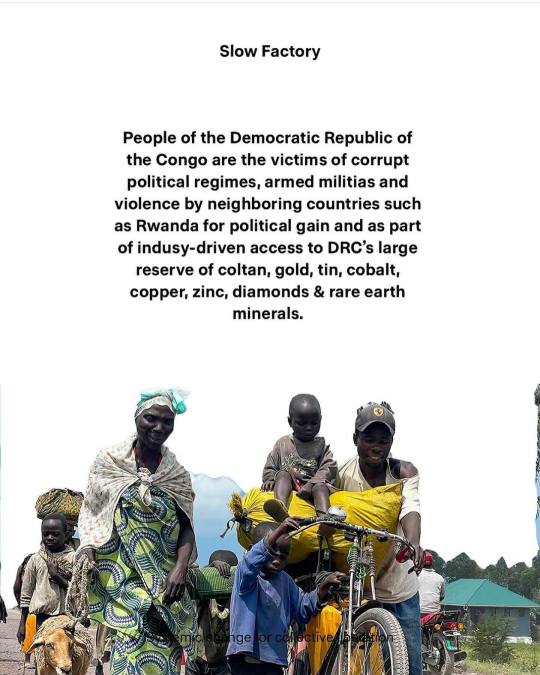
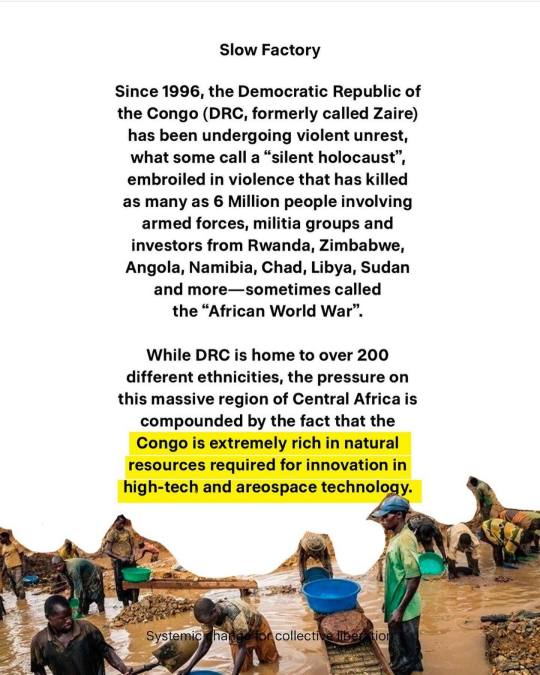
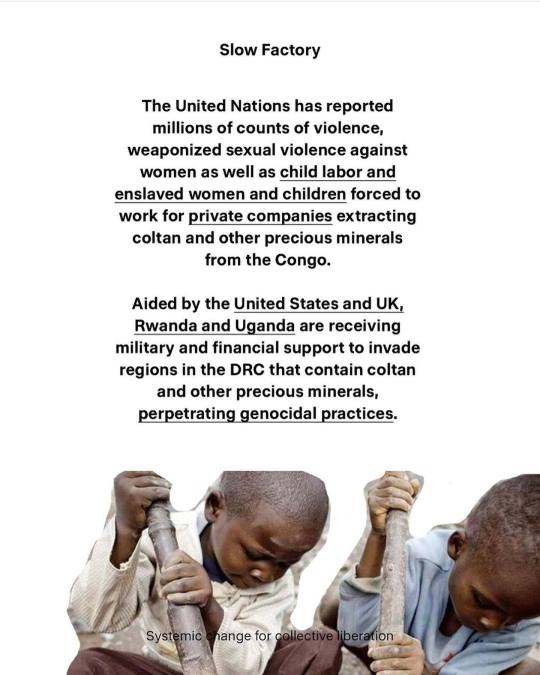
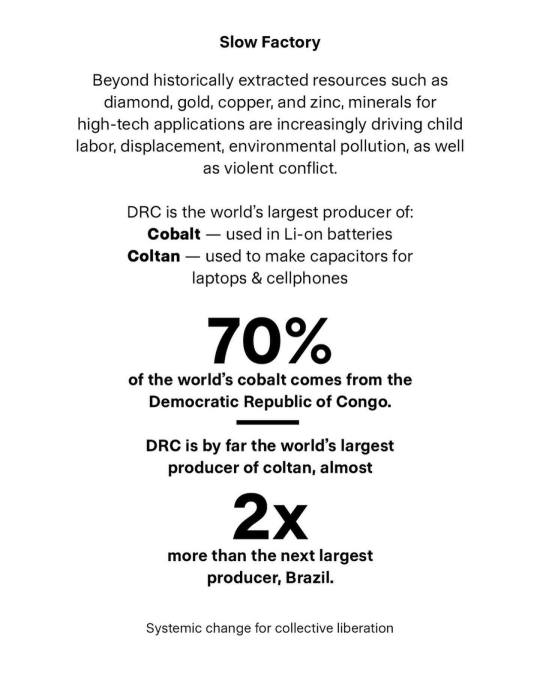
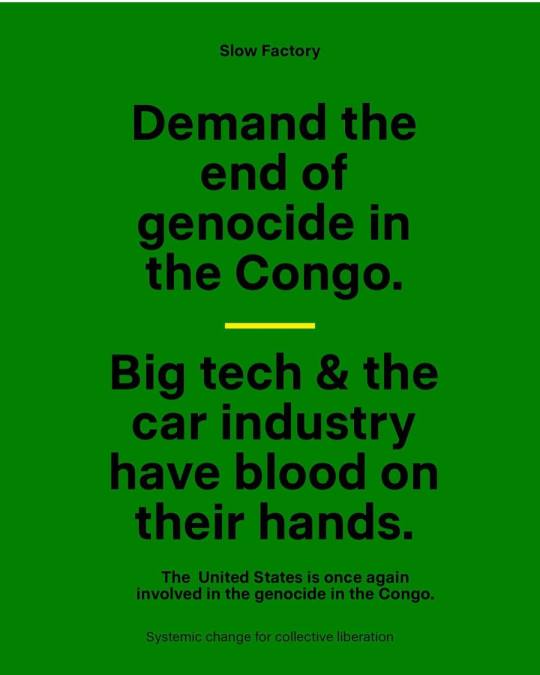
We really cannot be free until we all are free.
#Congo Genocide#Conflict Minerals#Cobalt Exploitation#Coltan Crisis#Resource Exploitation#Human Rights Abuse#Environmental Impact#Corporate Accountability#DRC#Mineral Supply Chain
14K notes
·
View notes
Text
I read an article lamenting how indian mangoes don’t get exported and how bad it is for the economy and how much money we’d make if we could figure out the supply chains as if this country wouldn’t collapse into civil war if in addition to 50°c summers and 10 hr power cuts we had to cope with mangoes becoming unavailable or unaffordable because they’re all being shipped off to whole foods so patricia can pay $15 for one (1) dussehri for her summer salad
2K notes
·
View notes
Text
UPS WORKERS HAVE REACHED A DEAL THAT MEETS THEIR DEMANDS AND AVERTED A STRIKE!!!
EDIT 7/27/23: please reblog this version of the post instead! it provides a fuller picture of what’s going on and explains why this isn’t over yet.
#i know that this is tumblr and we love our Hot Strike Summer here but THIS IS GOOD!!!! THIS IS FANTASTIC!!!!!!#workers got the terms they were asking for without having to forgo work and pay to do it#and the ppl who would be hardest-hit by supply chain issues (i.e. those who need particular medications supplies etc) will be safer as well!#labor rights#ups#ups strike
8K notes
·
View notes
Text
So I'm just putting this out here, as someone with nearly 30 years in supply chain management. There's at least 7 working days before christmas where the naughty nice list is not available for corrections. It's just not feasible, orders have to be placed, supplies have to be loaded. If there's a toy for you on like Dec. 18, it doesn't matter what you do on the 19th, it's still coming. And this is only if he's using off the shelf supplies, like barbies or whatever. If it's handmade by the elves? Bump that back about a month. Everyone puts those elf on the shelves out just in time for their "job" to be useless. That elf could watch you kill your entire family and then eat them, and it won't affect the list.
#christmas#supply chain management#It's crazy that supply chain management is already a tag.#aging website
2K notes
·
View notes
Text
Award-winning journalist, Alex Newman, sheds light on a 2013 UN report asserting that meat, chicken and traditional agriculture are "not sustainable", and that a "major propaganda campaign" is needed to persuade people to eat insects instead.
"So how are they gonna get people to eat bugs? Well, a combination of propaganda, indoctrinating children and making you very, very hungry... The goal, folks, is not to save the planet. It's not about global warming. It's not about sustainable development. It's about enslaving humanity."
"They want to wipe out small and medium sized producers, centralise food control in the hands of mega corporations in bed with the mega governments. They want to move the population into the mega cities, and ultimately bring about this Great Reset and what they call the New World Order."
This is Agenda 21 to which 179 nations signed up to in 1992. 🤔
#pay attention#educate yourselves#educate yourself#knowledge is power#reeducate yourself#reeducate yourselves#think about it#think for yourselves#think for yourself#do your homework#do your own research#do some research#ask yourself questions#question everything#agenda 2030#alex newman#news#food supply chain#food supply
581 notes
·
View notes
Text
The US Government Is At It Again, Raiding More Organic/ Raw Milk Farms. If You Don’t Pump Your Cattle Full Of Their Mandated Vaccine Poisons, They’re Coming After You 🤔
#pay attention#educate yourself#educate yourselves#wake the fuck up#do your own research#do your homework#wake up#do some research#exposing the truth#knowledge is power#reeducate yourself#milk#farmers#government corruption#fda corruption#food supply#food supply chain
384 notes
·
View notes
Text
The unexpected upside of global monopoly capitalism

I'm touring my new, nationally bestselling novel The Bezzle! Catch me TODAY (Apr 10) at UCLA, then Chicago (Apr 17), Torino (Apr 21) Marin County (Apr 27), Winnipeg (May 2), Calgary (May 3), Vancouver (May 4), and beyond!

Here's a silver lining to global monopoly capitalism: it means we're all fighting the same enemy, who is using the same tactics everywhere. The same coordination tools that allow corporations to extend their tendrils to every corner of the Earth allows regulators and labor organizers to coordinate their resistance.
That's a lesson Mercedes is learning. In 2023, Germany's Supply Chain Act went into effect, which bans large corporations with a German presence from using child labor, violating health and safety standards, and (critically) interfering with union organizers:
https://www.bafa.de/EN/Supply_Chain_Act/Overview/overview_node.html
Across the ocean, in the USA, Mercedes has a preference for building its cars in the American South, the so-called "right to work" states where US labor law is routinely flouted and unions are thin on the ground. As The American Prospect's Harold Meyerson writes, the only non-union Mercedes factories in the world are in the US:
https://prospect.org/labor/2024-04-08-american-workers-german-law-uaw-unions/
But American workers – especially southern workers – are on an organizing tear, unionizing their workplaces at a rate not seen in generations. Their unprecedented success is down to their commitment, solidarity and shrewd tactics – all buoyed by a refreshingly pro-worker NLRB, who have workers' backs in ways also not seen since the Carter administration:
https://pluralistic.net/2023/09/14/prop-22-never-again/#norms-code-laws-markets
Workers at Mercedes' factory in Vance, Alabama are trying to join the UAW, and Mercedes is playing dirty, using the tried-and-true union-busting tactics that have held workplace democracy at bay for decades. The UAW has lodged a complaint with the NLRB, naturally:
https://www.commondreams.org/news/alabama-mercedes-benz
But the UAW has also filed a complaint with BAFA, the German regulator in charge of the Supply Chain Act, seeking penalties against Mercedes-Benz Group AG:
https://uaw.org/uaw-files-charges-in-germany-against-mercedes-benz-companys-anti-union-campaign-against-u-s-autoworkers-violates-new-german-law-on-global-supply-chain-practices/
That's a huge deal, because the German Supply Chain Act goes hard. If Mercedes is convicted of union-busting in Alabama, its German parent-company faces a fine of 2% of its global total revenue, and will no longer be eligible to sell products to the German government. Chomp.
Now, the German Supply Chain Act is new, and this is the first petition filed by a non-German union with BAFA, so it's not a slam dunk. But supermajorities of Mercedes workers at the Alabama factory have signed UAW cards, and the election is going to happen in May or June. And the UAW – under new leadership, thanks to a revolution that overthrew the corrupt old guard – has its sights set on all the auto-makers in the American south.
As Meyerson writes, the south is America's onshore offshore, a regulatory haven where corporations pay minimal or no tax and are free to abuse their workers, pollute, and corrupt local governments with a free hand (no wonder American industry is flocking to these states). Meyerson: "The economic impact of unionizing the South, in other words, could almost be placed in the same category as reshoring work that had gone to China."
The German Supply Chain Act was passed with the help of Germany's powerful labor unions, in an act of solidarity with workers employed by German companies all over the world. This is that unexpected benefit to globalism: the fact that Mercedes has extrusions into both the American and German political spheres means that both American and German workers can collaborate to bring it to heel.
The same is true for antitrust regulators. The multinational corporations that are in regulators' crosshairs in the US, the EU, the UK, Australia, Japan, South Korea and beyond use the same playbook in every country. That's doubly true of Big Tech companies, who literally run the same code – embodying the same illegal practices – on servers in every country.
The UK's Competition and Markets Authority has led the pack on convening summits where antitrust enforcers from all over the world gather to compare notes and collaborate on enforcement strategies:
https://www.eventbrite.co.uk/e/cma-data-technology-and-analytics-conference-2022-registration-308678625077
And the CMA's Digital Markets Unit – which boasts the the largest tech staff of any competition regulator in the world – produces detailed market studies that turn out to be roadmaps for other territories' enforces to follow – like this mobile market study:
https://assets.publishing.service.gov.uk/media/63f61bc0d3bf7f62e8c34a02/Mobile_Ecosystems_Final_Report_amended_2.pdf
Which was extensively referenced in the EU during the planning of the Digital Markets Act, and in the US Congress for similar legislation:
https://www.congress.gov/bill/117th-congress/senate-bill/2710
It also helped enforcers in Japan:
https://asia.nikkei.com/Business/Technology/Japan-to-crack-down-on-Apple-and-Google-app-store-monopolies
And South Korea:
https://www.reuters.com/technology/skorea-considers-505-mln-fine-against-google-apple-over-app-market-practices-2023-10-06/
Just as Mercedes workers in Germany and the USA share a common enemy, allowing for coordinated action that takes advantage of vulnerable flanks wherever they are found, anti-monopoly enforcers are sharing notes, evidence, and tactics to strike at multinationals that are bigger than most countries – but not when those countries combine.
This is an unexpected upside to global monopolies: when we all share a common enemy, we've got endless opportunities for coordinated offenses and devastating pincer maneuvers.

If you'd like an essay-formatted version of this post to read or share, here's a link to it on pluralistic.net, my surveillance-free, ad-free, tracker-free blog:
https://pluralistic.net/2024/04/10/an-injury-to-one/#is-an-injury-to-all
#pluralistic#monopoly#labor#nlrb#germany#harold meyerson#supply chain act#right to work#onshore offshore#uaw#vance alabama#vance#alabama#bafa#mercedes#antitrust#trustbusting
708 notes
·
View notes
Text

Not an ordinary cucumber! This cucumber was smuggled with one of the truck drivers from the south of the Gaza Strip to the city of Azza. I was lucky to get it as a valuable gift from my husband’s friend. Then I decided to give it to my mother, who kept it for a day and then sent it to my sister, who divided it into two halves. Half I made a salad with and the other half I shared. With her neighbor. One smuggled cucumber was happily eaten by 15 people. Today my nephew Ahmed came to me and said to me: “Auntie, can I tell you a secret? Yesterday we ate cucumbers.” Azza
@heritageposts @neatfrog @nuclearhearts @megxolotl @schoolhater @pretendingtobeaperson @a-hopeless-aromantic @orchidvioletindigo @ignoranceishibiscus @bilal-salah0 @ihavenoideashelp @monsterbutch @buttercupart @acepumpkinpatrick @just-browsings-world @heliopixels @pomodorosa @pollackpatrol @murderbot @mushroomjar @kahin @clay-pidgeon @jezior0 @thrashfish @chronicschmonic @magnus-rhymes-with-swagness @malcriada @ana-bananya @retvolution @deathlonging @appsa @brokenbackmountain @sleevesareforlosers @strawberrysnipes @laurapalmersdiary @a1m3 @lesbiandardevil @rhubarbspring @transmutationisms @a-shade-of-blue @neptunering @dlxxv-vetted-donations @northgazaupdates2 @foodforthot420 @deepspaceboytoy @turtletoria @khanger @devilofthestars @feefantinato-blog @fee @fools-and-perverts2 @bahrmp3
#stillindigo#mogai flag#miku fanart#@gazaavetters#from the river to the sea palestine will be free#free palestine#free gaza#tumblr milestone#olympics#hatsune miku#dan and phil#mlp#disney#follow#share#please help#palestinian donations#support#supply chain optimization
126 notes
·
View notes
Text









623 notes
·
View notes
Text
"Nasir Mansoor has spent 40 years fighting for Pakistan’s workers. Whether demanding compensation on behalf of the hundreds of people who died in a devastating 2012 factory fire in Karachi or demonstrating against Pakistani suppliers to global fashion brands violating minimum wage rules, he’s battled many of the country’s widespread labor injustices.
Yet so far, little has improved, said Mansoor, who heads Pakistan’s National Trade Union Federation in Karachi... Regulations and trade protocols look good on paper, but they rarely trickle down to the factory level. “Nobody cares,” Mansoor said. “Not the government who makes commitments, not the brands, and not the suppliers. The workers are suffering.”
Change on the Horizon
But change might finally be on the horizon after Germany’s new Supply Chain Act came into force last year. As Europe’s largest economy and importer of clothing, Germany now requires certain companies to put risk-management systems in place to prevent, minimize, and eliminate human rights violations for workers across their entire global value chains. Signed into law by German Chancellor Olaf Scholz in January 2023, the law covers issues such as forced labor, union-busting, and inadequate wages, for the first time giving legal power to protections that were previously based on voluntary commitments. Companies that violate the rules face fines of up to 8 million euros ($8.7 million)...
...As governments come to realize that a purely voluntary regimen produces limited results, there is now a growing global movement to ensure that companies are legally required to protect the people working at all stages of their supply chains.
The German law is just the latest example of these new due diligence rules—and it’s the one with the highest impact, given the size of the country’s market. A number of other Western countries have also adopted similar legislation in recent years, including France and Norway. A landmark European Union law that would mandate all member states to implement similar regulation is in the final stages of being greenlighted.
Although the United States has legislation to prevent forced labor in its global supply chains, such as the 2021 Uyghur Forced Labor Prevention Act, there are no federal laws that protect workers in other countries from abuses that fall short of forced labor. That said, a proposed New York state bill, the Fashion Act, would legally require most major U.S. and international brands to identify, prevent, and remediate human rights violations in their supply chain if passed, with noncompliance subject to fines. Since major fashion brands could hardly avoid selling their products in New York, the law would effectively put the United States on a similar legal level as Germany and France...
The Results So Far
As of January, Germany’s new law applies to any company with at least 1,000 employees in the country, which covers many of the world’s best-known fast fashion retailers, such as Zara and Primark. Since last January [Jan 2023], German authorities say they have received 71 complaints or notices of violations and conducted 650 of their own assessments, including evaluating companies’ risk management.
In Pakistan, the very existence of the German law was enough to spark action. Last year, Mansoor and other union representatives reached out to fashion brands that sourced some of their clothing in Pakistan to raise concerns about severe labor violations in garment factories. Just four months later, he and his colleagues found themselves in face-to-face meetings with several of those brands—a first in his 40-year career. “This is a big achievement,” he said. “Otherwise, [the brands] never sit with us. Even when the workers died in the factory fire, the brand never sat with us.” ...
-via The Fuller Project, April 2, 2024. Article headers added by me.
Article continues below, with more action-based results, including one factory that "complied, agreeing to respect minimum wages and provide contract letters, training on labor laws, and—for the first time—worker bonuses"
With the help of Mansoor and Zehra Khan, the general secretary of the Home-Based Women Workers Federation, interviews with more than 350 garment workers revealed the severity of long-known issues.
Nearly all workers interviewed were paid less than a living wage, which was 67,200 Pakistan rupees (roughly $243) per month in 2022, according to the Asia Floor Wage Alliance. Nearly 30 percent were even paid below the legal minimum wage of 25,000 Pakistani rupees per month (roughly $90) for unskilled workers. Almost 100 percent had not been given a written employment contract, while more than three-quarters were either not registered with the social security system—a legal requirement—or didn’t know if they were.
When Mansoor, Khan, and some of the organizations raised the violations with seven global fashion brands implicated, they were pleasantly surprised. One German retailer reacted swiftly, asking its supplier where the violations had occurred to sign a 14-point memorandum of understanding to address the issues. (We’re unable to name the companies involved because negotiations are ongoing.) The factory complied, agreeing to respect minimum wages and provide contract letters, training on labor laws, and—for the first time—worker bonuses.
In February [2024], the factory registered an additional 400 workers with the social security system (up from roughly 100) and will continue to enroll more, according to Khan. “That is a huge number for us,” she said.
It’s had a knock-on effect, too. Four of the German brand’s other Pakistani suppliers are also willing to sign the memorandum, Khan noted, which could impact another 2,000 workers or so. “The law is opening up space for [the unions] to negotiate, to be heard, and to be taken seriously,” said Miriam Saage-Maass, the legal director at ECCHR.
Looking Forward with the EU
...Last month [in March 2024], EU member states finally approved a due diligence directive after long delays, during which the original draft was watered down. As it moves to the next stage—a vote in the European Parliament—before taking effect, critics argue that the rules are now too diluted and cover too few companies to be truly effective. Still, the fact that the EU is acting at all has been described as an important moment, and unionists such as Mansoor and Khan wait thousands of miles away with bated breath for the final outcome.
Solidarity from Europe is important, Khan said, and could change the lives of Pakistan’s workers. “The eyes and the ears of the people are looking to [the brands],” Mansoor said. “And they are being made accountable for their mistakes.”"
-via The Fuller Project, April 2, 2024. Article headers added by me.
#pakistan#fashion#fashion industry#fast fashion#labor#labor unions#labor rights#unions#workers rights#capitalism#european union#germany#united states#new york#garment industry#garment manufacturing#supply chain#good news#hope
212 notes
·
View notes
Text
THERE'S ALSO A GENOCIDE HAPPENING IN THE CONGO!!!!! THERE'S ALSO A GENOCIDE HAPPENING IN THE CONGO!!!!! THERE'S ALSO A GENOCIDE HAPPENING IN THE CONGO!!!!!
#congo#genocide#horror#congo genocide#conflict minerals#cobalt exploitation#coltan crisis#resource exploitation#human rights abuse#environmental impact#corporate accountability#drc#mineral supply chain
2K notes
·
View notes
Link
Research has found that some dark chocolate bars contain cadmium and lead—two heavy metals linked to a host of health problems in children and adults.
The chocolate industry has been grappling with ways to lower those levels. To see how much of a risk these favorite treats pose, Consumer Reports scientists recently measured the amount of heavy metals in 28 dark chocolate bars. They detected cadmium and lead in all of them.
CR tested a mix of brands, including smaller ones, such as Alter Eco and Mast, and more familiar ones, like Dove and Ghirardelli.
For 23 of the bars, eating just an ounce a day would put an adult over a level that public health authorities and CR’s experts say may be harmful for at least one of those heavy metals. Five of the bars were above those levels for both cadmium and lead.
That’s risky stuff: Consistent, long-term exposure to even small amounts of heavy metals can lead to a variety of health problems. The danger is greatest for pregnant people and young children because the metals can cause developmental problems, affect brain development, and lead to lower IQ, says Tunde Akinleye, the CR food safety researcher who led this testing project.
“But there are risks for people of any age,” he says. Frequent exposure to lead in adults, for example, can lead to nervous system problems, hypertension, immune system suppression, kidney damage, and reproductive issues. While most people don’t eat chocolate every day, 15 percent do, according to the market research firm Mintel. Even if you aren’t a frequent consumer of chocolate, lead and cadmium can still be a concern. It can be found in many other foods—such as sweet potatoes, spinach, and carrots—and small amounts from multiple sources can add up to dangerous levels. That’s why it’s important to limit exposure when you can.
[...]
Some of the same concerns may extend to products made with cocoa powder—which is essentially pure cocoa solids—such as hot cocoa, and brownie and cake mixes, though they have varying amounts of cacao and possibly heavy metals.
(15 December 2022)
there’s a lot more detail in the article about specific brands, different ways lead and cadmium get into cacao, prior studies and litigation, etc.
the article is written with an optimistic tone about mitigation strategies for you as A Consumer—try to choose brands with lower levels of lead and cadmium! eat lower-percent-cacao chocolates, eat them less often, don’t give dark chocolate to kids, etc.—but it’s ultimately another example of food produced under capitalism being contaminated, and how you cannot escape that by just Shopping Smarter, or by hoping liberal regulation (or lawsuits) will prevent it. especially considering all of the other contaminated products mentioned or linked in the article as See Also’s:
MORE ON FOOD SAFETY
• Your Spices Could Contain Lead and Arsenic
• Is Our Ground Meat Safe to Eat?
• Everything You Ever Wanted to Know About Costco Chicken
• Heavy Metals in Baby Food
• PFAS Chemicals in Food Packaging
Calculating the exact amount of dark chocolate that’s risky to eat is complicated. That’s because heavy metal levels can vary, people have different risk levels, and chocolate is just one potential source of heavy metal exposure.
the unstated corollary (because this is Consumer Reports and not Labor Reports) is that the overall exposure to lead and cadmium surely has to be many times worse for the people who actually work in production (often child slaves [1] [2] [3]). (I did a cursory search for information about the farmers’ exposure, but unfortunately, haven’t been able to find anything among all the results about contamination in the final product? If anyone has sources about that, I would really appreciate seeing them)
#cocoa#cacao#chocolate#food safety#food#food production#supply chains#capitalism#agriculture#metal exposure#lead#cadmium#my uploads#my uploads (unjank)
2K notes
·
View notes
Text
"Survival" game: Press X to destroy that tree bare-handed. Now you have Wood, press Enter to access your inventory and turn Wood into a Crafting Table. Now press E on your Crafting Table and use Coal and Iron to make a Steam Engine.
#minecraft and its consequences etc. etc.#I just think that if you're managing industrial supply chains 15 minutes into the game you shouldn't call it a 'survival' game#and 'crafting tables' shouldn't be fucking alchemy#cosas mias
81 notes
·
View notes
Text
I wonder how many business majors turn out like I did: disillusioned leftists who view all they learned for that degree with a healthy dose of skepticism.
#don't get me wrong there ARE things that are worth knowing. how to distribute a supply chain or scheduling a project efficiently#I'm a big fan of how it taught me to understand tariffs and PPP and comparative productivity etc#but most of what I got out of it was either understanding economics at scale or understanding human psychology/sociology wrt capitalism#anyway. weird thoughts after the hbomberguy video mentioned Somerton was a business grad more than once#phoenix talks
183 notes
·
View notes
Text

Source: 👇
I have been showing you it's coming, it's real and it's obvious. You can löök it up 👀 Löök what's happening in Idaho with the potato farms, the chicken and egg farms across the country and the bee keepers. 🤔
#pay attention#educate yourselves#educate yourself#knowledge is power#reeducate yourself#reeducate yourselves#think about it#think for yourselves#think for yourself#do your homework#do some research#do your own research#ask yourself questions#question everything#news#food shortages#food supply chain#food processing plants#government corruption#fda corruption
412 notes
·
View notes
Text
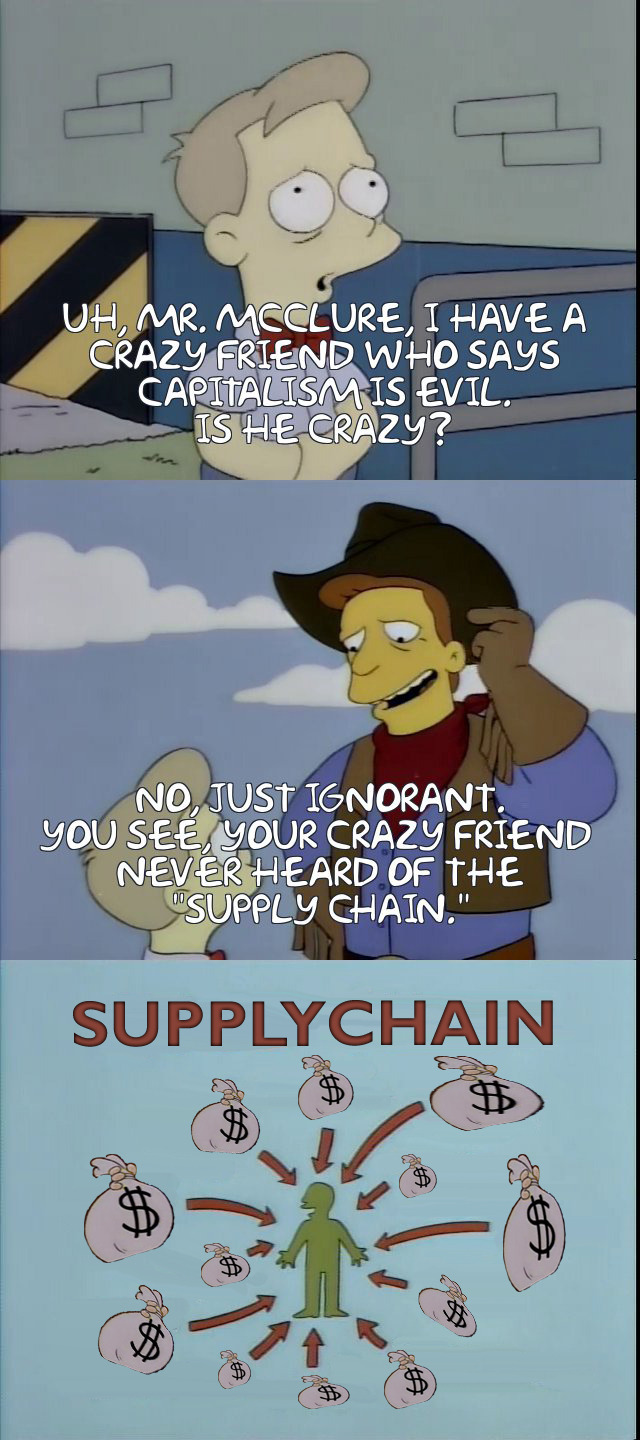
126 notes
·
View notes